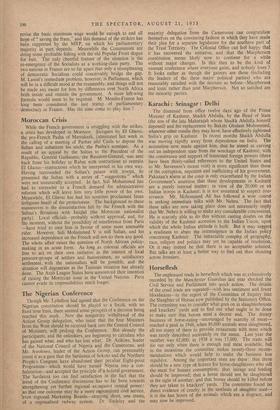Moroccan Crisis
While the French government is struggling with the strikes, a crisis has developed in Morocco. lntrigues by El Glaoui, the pro-French Pasha of Marrakesh, culminated last week in the calling of a meeting of Pashas and Caids to depose the Sultan and substitute his uncle, the Pasha's nominee. As a result of an appeal by the Sultan to the President of the Republic, General Guillaume, the Resident-General, was sent back from his holiday to Rabat with instructions to restrain El Glaoui—instructions which he interpreted in his own way. Having surrounded the Sultan's palace with , troops, he presented the ,Sultan with a series of " suggestions " which were not unnaturally accepted. In fact, Sidi Mohammed has had to surrender to a French demand for administrative reforms which will leave him very little power of his own. Meanwhile, El Glaoui has had his nominee proclaimed Iman (religious head) of the protectorate. The background to these manoeuvres is the dissatisfaction felt by the French with the Sultan's flirtations with Istiqlal (the Moroccan nationalist party). Local officials—probably without approval, and, for the moment, without the possibility of interference from Paris —have tried to oust him in favour of some more amenable ruler. However, Sidi Mohammed V is still Sultan, and his increased dependence on the French will not do them any good. The whole affair raises the question of North African policy- making in an acute form. As long as colonial officials are free to act on their own initiative in the interest of local pressure-groups of settlers and businessmen, no satisfactory settlement. with the nationalists will be possible, and the situation will degenerate as the Tunisian situation has already done. The Arab League States have announced their intention of raising the Moroccan issue in the United Nations. Paris cannot evade its responsibilities much longer.


























 Previous page
Previous page